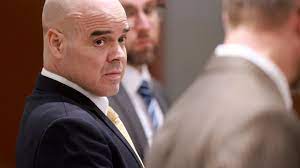In a courtroom drama that has captivated the nation, a former politician accused of murdering a Las Vegas journalist took the stand to proclaim his innocence. The high-profile case, which has drawn significant media attention, centers on the shocking death of Jeff German, a veteran investigative reporter known for his hard-hitting stories exposing corruption and crime. The accused, Robert “Bob” Anderson, a once-prominent local politician, has repeatedly denied any involvement in the crime, insisting that he is the victim of a political setup.
The Backstory: A Reporter’s Unyielding Pursuit of Truth
Jeff German was no stranger to controversy. Over his decades-long career, he had built a reputation as a fearless journalist who wouldn’t back down from powerful figures. His reporting had unearthed scandals, exposed corruption, and led to significant changes in local governance. German’s work had made him both respected and feared, and he was known for his relentless pursuit of the truth, regardless of the personal risks involved.
In the months leading up to his death, German had been investigating allegations of financial mismanagement and corruption involving Anderson. According to sources, German had uncovered potentially damning evidence that could have ended Anderson’s political career. However, before German could publish his findings, he was found dead outside his home in what police described as a targeted attack.
The Accusation: A Fall from Grace
Robert Anderson, once a rising star in Nevada’s political scene, quickly found himself at the center of the investigation. The case against him was built on a combination of circumstantial evidence and eyewitness testimony. Authorities claim that Anderson, fearing the consequences of German’s investigation, plotted and carried out the murder to silence the reporter.
Prosecutors have pointed to phone records, suspicious financial transactions, and witness statements that allegedly place Anderson near the scene of the crime. Additionally, investigators noted that Anderson had publicly clashed with German in the past, accusing the journalist of running a smear campaign against him.
Anderson’s arrest sent shockwaves through the local community, with many struggling to reconcile the image of a respected public servant with the heinous crime he is accused of committing.
Anderson’s Defense: Proclaiming Innocence on the Stand
During his testimony, Anderson vehemently denied any involvement in German’s murder. Dressed in a dark suit, he appeared composed as he addressed the court, refuting the charges against him. Anderson’s defense team argued that the case against him is based on flimsy evidence and that he is being framed by political enemies seeking to destroy his reputation.
“I am innocent,” Anderson told the jury, his voice steady but firm. “I did not kill Jeff German. I had no reason to, and I have been wrongfully accused.”
Anderson’s defense attorney, Sarah Mitchell, presented an alternative theory of the crime, suggesting that German had many enemies due to his work and that any number of people could have wanted him dead. Mitchell also highlighted inconsistencies in the prosecution’s case, questioning the reliability of the eyewitnesses and the validity of the forensic evidence.
Furthermore, Anderson testified that on the night of German’s murder, he was at home with his family, an alibi that his wife and children have corroborated. His defense has also raised concerns about the handling of the evidence, implying that key pieces of information may have been overlooked or manipulated to fit the narrative of his guilt.
A Community Divided
The trial has polarized public opinion, with some residents believing in Anderson’s innocence and others convinced of his guilt. Supporters of Anderson argue that he has been targeted because of his political connections and that the case against him is nothing more than a witch hunt. They point to his years of public service and argue that he has been unfairly vilified by the media.
On the other hand, many of German’s colleagues and supporters are calling for justice, arguing that the evidence against Anderson is compelling and that he must be held accountable for his actions. They see the murder as an attack on the free press and believe that Anderson’s conviction would send a strong message about the importance of protecting journalists.
The Impact on Journalism and Politics
This case underscores the dangerous intersection of journalism and politics, highlighting the risks that investigative reporters like Jeff German face when they expose corruption and wrongdoing. It also raises broader questions about the influence of power and money in the legal system, as well as the lengths to which some may go to silence those who threaten their status.
As the trial continues, all eyes are on the courtroom, where the outcome could have far-reaching implications for both the media landscape and the political climate in Nevada. The case serves as a stark reminder of the vital role that journalism plays in holding the powerful to account, even in the face of tremendous personal risk.
Whether Anderson’s testimony will be enough to sway the jury remains to be seen, but one thing is certain: the final verdict will resonate far beyond the courtroom, shaping the legacy of both Jeff German and Robert Anderson for years to come.











